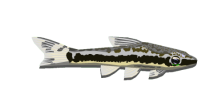syno multipunctatus
syno multipunctatus
One of my corys I found yesterday looked like it had been attacked, a gash in the head with several scales missing.
Im not sure if this is disease or if something is attacking it, I have a community tank, could my syno mulipunctatus be doing it in the night while scanning ground for food?
Kotty
Im not sure if this is disease or if something is attacking it, I have a community tank, could my syno mulipunctatus be doing it in the night while scanning ground for food?
Kotty
- Silurus
- Posts: 12420
- Joined: 31 Dec 2002, 11:35
- I've donated: $12.00!
- My articles: 55
- My images: 893
- My catfish: 1
- My cats species list: 90 (i:1, k:0)
- Spotted: 424
- Location 1: Singapore
- Location 2: Moderator Emeritus
- Kostas
- Posts: 791
- Joined: 23 Apr 2003, 10:57
- I've donated: $256.00!
- My images: 19
- My cats species list: 14 (i:0, k:0)
- My aquaria list: 1 (i:1)
- Spotted: 6
- Location 1: Greece,Athens
- Location 2: Greece,Athens
- Interests: Fishkeeping,diving,skiing,r/c modeling,growing Palm trees,ferns and tropical plants
- Contact:
Hi,
Yes it is possible.Most synos are not compatible with small,peaceful catfishes such as corydoras because they have a reputation to agression.But your syno is totaly uncompatible with corydoras because while your cory needs a ph around neutral to slightly acidic,your syno needs a ph very alkaline 8-9.Also they are not compatible because of the big difference between their adult size.Your syno will grow to 25-30cm while your cory will stay under 10 cm except if you have C. barbatus which grow to 11cm.
Yes it is possible.Most synos are not compatible with small,peaceful catfishes such as corydoras because they have a reputation to agression.But your syno is totaly uncompatible with corydoras because while your cory needs a ph around neutral to slightly acidic,your syno needs a ph very alkaline 8-9.Also they are not compatible because of the big difference between their adult size.Your syno will grow to 25-30cm while your cory will stay under 10 cm except if you have C. barbatus which grow to 11cm.
- Dinyar
- Posts: 1286
- Joined: 31 Dec 2002, 00:34
- My articles: 3
- My images: 227
- My catfish: 10
- My cats species list: 3 (i:10, k:0)
- Spotted: 94
- Location 1: New York, NY, USA
- Interests: Mochokidae, Claroteidae, Bagridae, Malepteruridae, Chacidae, Heteropneustidae, Clariidae, Sisoridae, Loricariiadae
With due respect to Kostas, I'd like to correct some misconceptions in his post.Kostas wrote:Hi,
Yes it is possible.Most synos are not compatible with small,peaceful catfishes such as corydoras because they have a reputation to agression.But your syno is totaly uncompatible with corydoras because while your cory needs a ph around neutral to slightly acidic,your syno needs a ph very alkaline 8-9.Also they are not compatible because of the big difference between their adult size.Your syno will grow to 25-30cm while your cory will stay under 10 cm except if you have C. barbatus which grow to 11cm.
1) Most Synos are perfectly compatible with small peaceful fish. To the extent that aggression is occasionally a problem, it's usually territorial, directed at larger fish, and can be solved by getting a bigger tank.
2) S. multipunctatus maxes out at about 10 cm.
The point about the different water chemistry required by Corydoras vs. S. multipunctatus is correct of course.
DInyar
- Sid Guppy
- Posts: 757
- Joined: 31 Dec 2002, 15:36
- Location 1: Brabant, the Netherlands
- Interests: Catfish, Tanganyikan fish, Rock'n'roll, Fantasy
Dinyar?
ehh
I think you made a wee mistake; it's of course PETRICOLA that maxes out on 10 cm; multipunctatus -Chuckoo cats- reach 15-25 cm depending on subspecies/variety.S. multipunctatus maxes out at about 10 cm.
Kostas; to name a few Syno's that are OK with Cory's:
S nigriventris
S contractus
S flavitaeniatus
S pleurops
S notatus
S alberti
S robbianus
S afrofisheri
etc
Plan B should not automatically be twice as much explosives as Plan A
- Dinyar
- Posts: 1286
- Joined: 31 Dec 2002, 00:34
- My articles: 3
- My images: 227
- My catfish: 10
- My cats species list: 3 (i:10, k:0)
- Spotted: 94
- Location 1: New York, NY, USA
- Interests: Mochokidae, Claroteidae, Bagridae, Malepteruridae, Chacidae, Heteropneustidae, Clariidae, Sisoridae, Loricariiadae
I should have said "average 10 cm SL". Some large specimens of S. multipunctatus I've seen may be a bit larger than that, but certainly well below 15 cm. Erwin Schraml reported seeing some preserved specimens ~20 cm. (His article on Tang Synos may have appeared in DATZ by now.) I certainly have never seen live specimens anywhere near that size.SG_Eurystomus wrote:I think you made a wee mistake; it's of course PETRICOLA that maxes out on 10 cm; multipunctatus -Chuckoo cats- reach 15-25 cm depending on subspecies/variety.
I don't see a significant size difference between S. multipunctatus and larger "varieties" of the S. petricola complex. If anything, large petris are bigger than large multis.
As for compatibility with Corydoras, every riverine Syno species I've ever kept -- and I've kept many species -- would be compatible with Corydoras. They may kill other Synodontis, which they see as competition, but wouldn't bother to kill mere Corys.
Dinyar
- Sid Guppy
- Posts: 757
- Joined: 31 Dec 2002, 15:36
- Location 1: Brabant, the Netherlands
- Interests: Catfish, Tanganyikan fish, Rock'n'roll, Fantasy
Strange...
I've seen loads of them in the 7-8" range and the biggest one I ever saw was about 22-24 cm or so (a female). According to Rene Kruter (who has been at -or better in- the lake dozens of times) they can reach 30 cm, but I think that might be a bit over the top; fish often lookm bigger when diving.
I do however have heard that something in the diet might be missing so multipunctatus doesn't reach it's max length in captivity. Since for obvious reasons exporters ship the smaller ones (more fish in a box), this makes sense; we buy halfgrown or juvenile specimen (or breed them) and they don't reach the size they have in the lake.
But right now at verduijns' place there are many multipunctatus within the 7" range available.
It might also be true that most importers in your area get the syno's from a different source, so you got the smaller variety.
I've seen loads of them in the 7-8" range and the biggest one I ever saw was about 22-24 cm or so (a female). According to Rene Kruter (who has been at -or better in- the lake dozens of times) they can reach 30 cm, but I think that might be a bit over the top; fish often lookm bigger when diving.
I do however have heard that something in the diet might be missing so multipunctatus doesn't reach it's max length in captivity. Since for obvious reasons exporters ship the smaller ones (more fish in a box), this makes sense; we buy halfgrown or juvenile specimen (or breed them) and they don't reach the size they have in the lake.
But right now at verduijns' place there are many multipunctatus within the 7" range available.
It might also be true that most importers in your area get the syno's from a different source, so you got the smaller variety.
Plan B should not automatically be twice as much explosives as Plan A
- Dinyar
- Posts: 1286
- Joined: 31 Dec 2002, 00:34
- My articles: 3
- My images: 227
- My catfish: 10
- My cats species list: 3 (i:10, k:0)
- Spotted: 94
- Location 1: New York, NY, USA
- Interests: Mochokidae, Claroteidae, Bagridae, Malepteruridae, Chacidae, Heteropneustidae, Clariidae, Sisoridae, Loricariiadae





